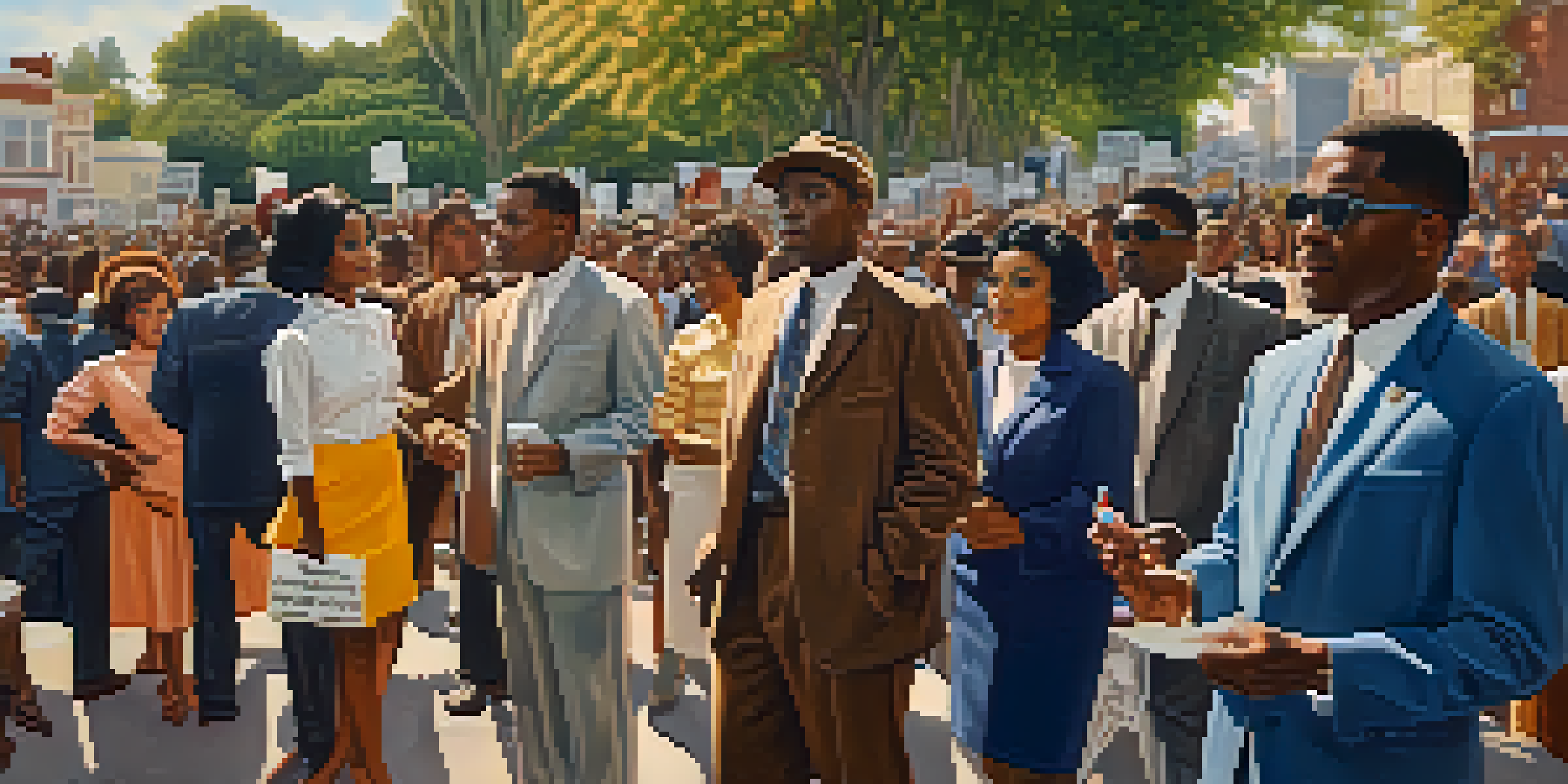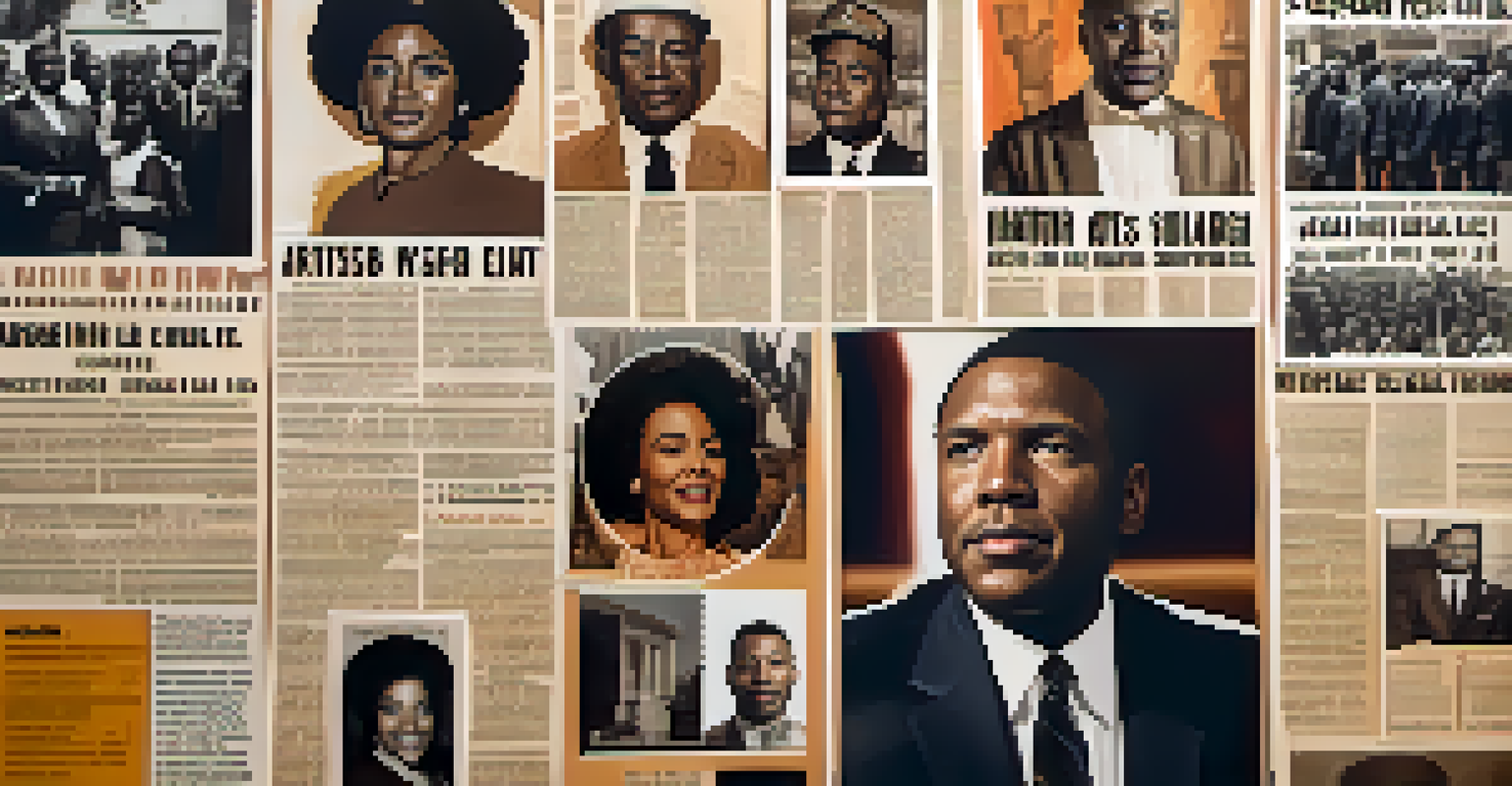Compton's Civil Rights Movement: A Historical Overview

The Roots of Compton's Civil Rights Activism
Compton, a city in Los Angeles County, became a focal point for civil rights activism in the 1960s. The city's demographics shifted significantly after World War II, with many African Americans moving in search of better opportunities. This change set the stage for a burgeoning sense of community and a collective push for equality. As residents faced systemic racism and social injustice, the call for civil rights became increasingly urgent.
Injustice anywhere is a threat to justice everywhere.
Local leaders emerged, inspired by the broader national movement, advocating for fair housing, educational opportunities, and voting rights. The grassroots efforts in Compton were fueled by the shared experiences of discrimination and the desire for a better future. Community organizations, such as the Compton chapter of the NAACP, played a crucial role in mobilizing residents and addressing local issues.
These early activists laid the groundwork for a strong civil rights movement in Compton, highlighting the importance of local action in the fight against inequality. Their determination showcased a belief that change was possible, igniting a spark that would resonate throughout the city and beyond.
Key Events that Shaped the Movement
Throughout the 1960s and 1970s, Compton witnessed several pivotal events that galvanized the civil rights movement. One of the most significant was the 1965 Watts Riots, which, although centered in a neighboring community, reverberated throughout Compton. The unrest highlighted the deep-seated frustrations and inequities faced by African Americans, prompting a surge in activism within Compton itself.

In response to widespread discontent, local leaders organized marches, rallies, and community forums to address grievances. These events not only raised awareness but also fostered a sense of solidarity among residents. For instance, the 'Compton Peace and Unity Rally' in 1966 drew thousands, showcasing the community's commitment to non-violent activism and collaboration.
Compton's Activism Roots
Compton's civil rights activism emerged in the 1960s as a response to systemic racism and social injustice faced by its African American community.
These key moments served as a catalyst for change, inspiring many to join the movement and advocate for civil rights. They emphasized the importance of unity and collective action in the pursuit of justice, reinforcing the idea that every voice matters in the fight for equality.
The Role of Local Leaders and Organizations
Local leaders played a vital role in Compton's civil rights movement, serving as catalysts for change and inspiration for their communities. Figures like Dr. A. L. Williams and Rev. Thomas A. McCarty worked tirelessly to uplift the voices of the marginalized. Their efforts in organizing campaigns and rallies helped educate residents about their rights and the importance of civic engagement.
The time is always right to do what is right.
Organizations such as the Compton chapter of the NAACP and the Urban League were instrumental in advocating for social reforms. They worked on initiatives that addressed issues like police brutality, economic inequality, and discriminatory housing practices. These groups not only provided support but also fostered a sense of identity and empowerment among residents.
The synergy between local leaders and grassroots organizations exemplified the strength of community-driven activism. Together, they created a network of support that empowered individuals to take action, emphasized the importance of education, and reinforced the belief that change could be achieved through collective effort.
Challenges Faced by Activists in Compton
Despite the passionate activism in Compton, civil rights leaders faced significant challenges. Resistance from local authorities and law enforcement often led to confrontations, making it difficult for activists to organize peacefully. The fear of retaliation loomed large, as many faced threats and violence for standing up against systemic injustice.
Economic hardships also posed a challenge, as many activists struggled to sustain their efforts while making a living. Fundraising became a critical component, as community members rallied to support initiatives aimed at improving social conditions. This financial strain underscored the reality that activism often comes at a personal cost.
Local Leaders Foster Change
Key local leaders and organizations played a crucial role in mobilizing residents and advocating for social reforms in Compton.
Nonetheless, the resilience of Compton's activists shone through these challenges. Their determination to fight for justice, despite the obstacles, served as a powerful reminder of the spirit of the civil rights movement. The difficulties they faced only strengthened their resolve to create a better future for generations to come.
The Impact of National Civil Rights Movements
The civil rights movement in Compton was deeply influenced by national events and figures, creating a ripple effect that inspired local activism. Leaders like Martin Luther King Jr. and Malcolm X resonated with Compton residents, providing a framework for their struggles. Their messages of equality, justice, and empowerment encouraged individuals to take a stand against oppression.
The media coverage of national protests and demonstrations also brought attention to local issues, helping to unite communities in their fight for civil rights. Compton residents found strength in the larger movement, recognizing that their struggles were part of a nationwide effort for equality. This connection fostered a sense of belonging and urgency among activists.
As Compton's civil rights movement gained momentum, it began to contribute to the broader national narrative. The experiences and voices from Compton helped shape the fight for civil rights, underscoring the importance of local actions in the quest for justice. This interconnectedness highlighted that change can start anywhere, even in a small city like Compton.
The Legacy of Compton's Civil Rights Movement
The civil rights movement in Compton left an indelible mark on the community and beyond. The achievements of local activists paved the way for significant changes in policies affecting housing, education, and civil rights protections. These victories served as a testament to the power of grassroots organizing and community resilience.
In the years following the movement, the lessons learned in Compton continued to influence generations of activists. The city became a symbol of the fight for equality, inspiring future leaders to advocate for social justice. Efforts to honor and remember this legacy have led to the establishment of community programs and educational initiatives focused on civil rights.
Legacy of Resilience and Hope
The civil rights movement in Compton left a lasting legacy that continues to inspire ongoing activism and community engagement.
Today, the spirit of Compton's civil rights movement remains alive, reminding residents of the importance of standing up against injustice. The legacy of those who fought for equality serves as a beacon of hope, encouraging ongoing activism and community engagement in the pursuit of a better future.
Reflections on Compton's Civil Rights Journey
Reflecting on Compton's civil rights journey offers valuable insights into the struggle for equality. The experiences of activists remind us that the fight for justice is ongoing and requires continuous effort. Understanding the history of civil rights in Compton provides context for contemporary issues and reinforces the need for vigilance in protecting our rights.
As we look back, the stories of resilience, courage, and community action serve as powerful reminders of the impact one can make. Each voice contributes to the larger narrative, illustrating that change often starts at the local level. The lessons learned from Compton's movement encourage individuals to engage in their communities and advocate for justice.

Ultimately, Compton's civil rights movement is a testament to the enduring spirit of activism. It reminds us that while progress has been made, the journey toward equality continues, and every effort counts in the ongoing fight for justice and human rights.